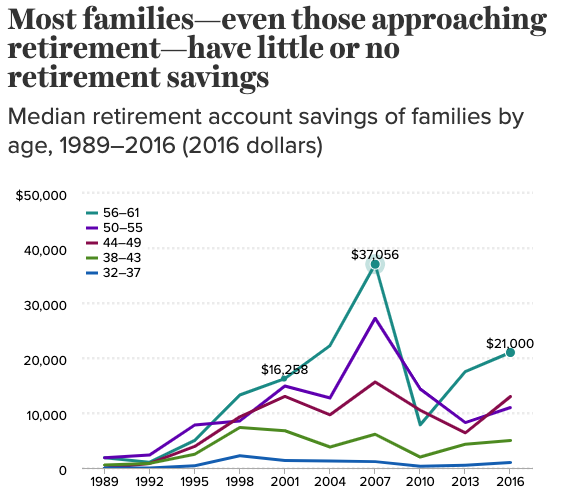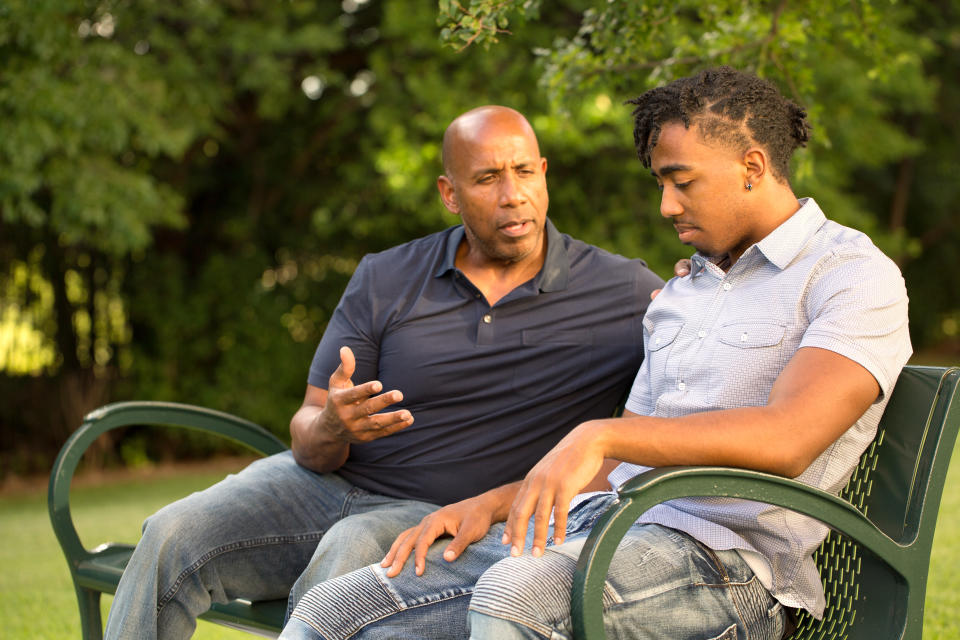What you don't know about your parents' retirement plans could hurt you financially
Most working Americans have no clue how prepared their parents are for retirement, a knowledge gap that could hurt their own finances.
About 7 in 10 of adults between 25 and 44 said they know little to nothing about their parents’ finances, according to a survey from AgeUp, an annuity product issued by MassMutual and sold by Haven Life Insurance Agency.
But nearly the same share expect they will need to financially help their parents if they outlive their savings. The survey polled 1,500 people and was given to Yahoo Finance exclusively.
This discrepancy comes at a time when those nearing retirement and their adult children are both vastly behind on saving for retirement.
“If [retirees] run out of money in later years, there will be a realization their [children] have to step in,” said Blair Baldwin, founder at AgeUp.

Retirement preparedness
While you should have eight times your starting salary by the time your 60 saved for retirement, most of those approaching retirement have vastly less than that. The median amount saved by those between 56 and 61 is $21,000, according to the Economic Policy Institute.
“For the retirement generation before, there were defined-benefit plans such as a pension,” said Edward Gottfried, group product manager at robo-advisor Betterment for Business. “This is the first generation where 401(k)s could make the bulk of retirement savings.”
The future of Social Security benefits and longer lifespans also worry many Americans when they think about their parents’ retirement.
About 7 in 10 Americans believe Social Security won’t be a reliable source of income when their parents reach their 90s, the survey found.
Recent research by the Social Security Administration highlights that trust fund reserves will be depleted starting in 2035 when the oldest baby boomers turn 89, and only 80% of the program’s costs will be funded. This could mean reduced benefits for retirees.

Half of respondents believe at least one parent will live into their 90s, while 3 in 5 worry about their parents running out of money in their later years, according to the survey.
Trends in longevity really have changed. “The average lifespan has gotten longer,” Baldwin said. “It’s not unheard of people living until their mid-90s or early 100s. That really is a new societal development.”
Children stepping in
Four in 5 adult children agreed they need to consider the needs of their parents and in-laws when planning their own long-term financial plans, according to the survey. But just over a third have done so.
If children don’t address the financial elephant in the room with their aging parents, the trickle-down effects include setbacks to their own goals.
“If they find out they need to help their parents with retirement or long-term care expenses, they will have to dial back on their own retirement contributions or even their educational savings for their kids,” said Henry Hoang, a certified financial planner at Bright Wealth Advisors in Irvine, California.
But not all consequences are financial. A lack of transparency can simply erode trust between generations, Hoang said.
“If we ignore potential issues that’s going to build up resentment even within the most generous and well-intentioned people,” Hoang said. “This is often due to seeing your own personal objectives taking a step back.”
Having the conversation
Talking to parents about their personal finances is the second most awkward subject for adults, according to the study. But experts say there are ways of alleviating the uncomfortable feeling. The first step is reframing the discussion as soon as possible.
“Taking a holistic view of retirement readiness will have you be more prepared,” said Gottfried, who recommends having the initial conversation 10 to 15 years before the parents’ retirement. “Think of it as an activity around [goal-setting].”
Financial advisors also recommend asking if your parents have a reliable financial plan.
“I’d ask them if they have a plan to create predictable income during retirement years,” said Hoang. “The moment even people have to turn one million in assets into income is a different feeling and experience.”
Another tip Hoang has for those nervous about the ‘talk’ is asking if their parent’s retirement plans consider unexpected expenses.

“If you are fairly healthy you can live past 85 years,” Hoang said. “So, in that case, you should be realistic about retirement projections covering risk of inflation as well as healthcare costs.”
If you’re still struggling to approach the conversation, remember that having the conversation now will make it easier for future family conversations.
“Approach the conversation from a place of love and family support,” Baldwin said.
Parents’ responsibilities
While it may fall to millennials and Gen Xers to initiate the financial conversation, their parents should do their part to shore up their finances as much as possible before their golden years.
As a starting point, they can take advantage of catch-up contributions to retirement accounts.
For instance, those above 50 can contribute an extra $6,500 to their 401ks, above the $19,500 contribution limit for 2020. They can also sock away an additional $1,000 to IRA accounts on top of the $6,000 limit for 2020.
“Before you reach that retirement runway,” Gottfried said, “look at the type of life you want and be open to approaches outside of money you’ve already saved.”
Dhara is a writer for Yahoo Finance. Follow her on Twitter @dsinghx.
Read more:
Some American homeowners are making a big retirement mistake, survey finds
Gen Z more than doubles its presence in housing market, study finds
Follow Yahoo Finance on Twitter, Facebook, Instagram, Flipboard, SmartNews, LinkedIn, YouTube, and reddit.

 money
money 